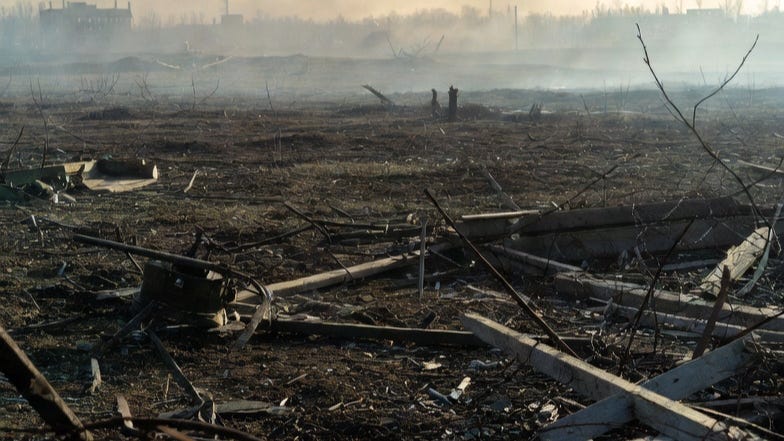10 Things Weekly Roundup - 14th November 2025
A Week of Strain: Power, Ceasefires and the Limits of Diplomacy
A week defined more by accumulated pressure than decisive shifts, with domestic politics, regional conflicts, climate diplomacy and institutional credibility all operating close to their limits.
This was a week where systems held, but often only narrowly. The longest US federal shutdown in history finally ended after days of tense negotiation; multiple conflicts edged through unstable periods of pause and pressure; climate diplomacy returned to the global stage just as the physical effects of warming became starker; and institutions managing contested narratives found themselves under renewed scrutiny. The pattern was not one of dramatic reconfiguration but of sustained stress across several fronts.
The week opened with a significant milestone: the resolution of the longest government shutdown in US history. Its conclusion required determined negotiation and exposed familiar divisions within Congress, where narrow majorities again shaped both the pace and structure of compromise. The result was not a new political alignment, but a reminder that routine governance in Washington increasingly depends on prolonged bargaining and intermittent brinkmanship.
This domestic turbulence contrasted with a more assertive posture overseas. Signals of intensified activity in security operations abroad, together with discussions about stabilisation efforts in major conflict zones, suggested a widening gap between internal cohesion and external ambition. The United States appeared more willing to project influence abroad even as its ability to manage internal disagreement remained constrained.
The juxtaposition reinforced a broader pattern: a political system that struggles to maintain stable consensus domestically while simultaneously advancing a more confident and interventionist role internationally.
Across multiple conflict zones, the week underscored how difficult it is to sustain even limited periods of stability. In Ukraine, the military situation remained defined by attrition, with the pressures on major urban areas emphasising how far the conflict is from any durable settlement. Incremental advances and continued defence efforts illustrated a familiar dynamic: movement at the margins but no decisive shift in trajectory.
In the Middle East, efforts to stabilise conditions around Gaza continued against a backdrop of contested ceasefire terms and constrained humanitarian access. The tension lay not in a sudden escalation but in the delicate balance between political expectations, security considerations and the immediate needs of civilians. Developments in the West Bank added complexity to an already strained landscape.
Sudan’s conflict deepened further, with humanitarian and territorial concerns reinforcing the sense of a crisis expanding rather than contracting. Border tensions in Southeast Asia and isolated attacks in South Asia provided additional reminders that even seemingly peripheral disputes can unsettle regional stability when institutional buffers are weak.
Against this backdrop, Japan–China relations grew more strained, driven by remarks in Tokyo about potential Self-Defense Force involvement in a Taiwan contingency and a noticeably firmer line from Beijing. While neither side signalled imminent confrontation, the exchange demonstrated how shifts in rhetoric can influence a region where deterrence, signalling and perception are tightly linked.
COP30 offered a visible platform for climate diplomacy, but the week highlighted the gap between ambition and implementation. Attendance patterns and national positioning illustrated both the political challenges of reaching consensus and the limits of multilateral negotiation at a moment when global emissions remain high. Discussions over financing, fossil-fuel transitions and national responsibility repeated familiar divisions, reminding observers how much of the agenda remains unresolved.
Outside the conference halls, the physical realities of climate change were harder to ignore. Emissions data and economic pressures associated with the energy transition underscored the constraints facing policymakers, while signs of stress in water and agricultural systems showed the immediate consequences of environmental strain. The contrast between the symbolic weight of COP30 and the material effects observed elsewhere gave the climate debate a sharper edge.
The week’s developments crystallised a central tension: climate diplomacy is indispensable, yet often overtaken by the pace of change in the physical world and the domestic pressures shaping national decisions.
The final thread running through the week centred on institutional credibility. The BBC’s internal crisis — spanning an editing controversy, senior resignations and a formal institutional response — illustrated how even established organisations must navigate heightened expectations of transparency and accuracy. The episode was not merely a media story but a reflection of broader pressures on institutions responsible for shaping public understanding.
Elsewhere, conflicts highlighted the limitations of verification and oversight. Questions regarding humanitarian access, operational choices and the capacity of international bodies to monitor compliance reappeared across several regions. These issues reinforced the sense that institutions designed to manage accountability are often strained by the complexity and opacity of modern conflict environments.
Historical and legal inquiries added a further dimension, illustrating how societies continue to revisit past decisions in search of clarity and responsibility. Together, these developments demonstrated the challenges facing organisations that depend on public trust at a time when information flows quickly, narratives compete intensely and scrutiny is constant.
This was a week marked not by dramatic inflection points but by the cumulative weight of unresolved pressures. The end of the record US shutdown, contested ceasefires, constrained climate diplomacy and institutional scrutiny each reflected systems under strain rather than systems in transformation. Stability, where it existed, was fragile; where progress occurred, it often required significant effort to achieve modest gains.
The broader picture was one of a world where multiple challenges run in parallel, intersecting but not yet converging into a single defining crisis. The task for governments, institutions and international actors remains the same: to manage stress, maintain credibility and prevent localised tensions from expanding into wider instability.











